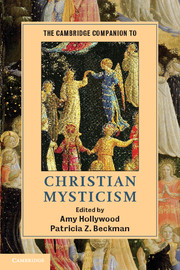Book contents
- Frontmatter
- Contents
- Contributors
- Introduction
- Part I Contexts
- 1 Early Monasticism
- 2 Song, Experience, and the Book in Benedictine Monasticism
- 3 New Forms of Religious Life in Medieval Western Europe
- 4 Early Modern Reformations
- Part II Key Terms
- Part III Contemporary Questions
- Select Bibliography of Christian Mystical Texts up to around 1750
- Select Bibliography of Modern Works Related to the Study of Western Christian Mysticism
- Author and Artist Index
- General Index
- References
1 - Early Monasticism
from Part I - Contexts
Published online by Cambridge University Press: 05 December 2012
- Frontmatter
- Contents
- Contributors
- Introduction
- Part I Contexts
- 1 Early Monasticism
- 2 Song, Experience, and the Book in Benedictine Monasticism
- 3 New Forms of Religious Life in Medieval Western Europe
- 4 Early Modern Reformations
- Part II Key Terms
- Part III Contemporary Questions
- Select Bibliography of Christian Mystical Texts up to around 1750
- Select Bibliography of Modern Works Related to the Study of Western Christian Mysticism
- Author and Artist Index
- General Index
- References
Summary
INTRODUCTION
A story from the Apophthegmata Patrum provides an intriguing glimpse into the mystical impulse at the heart of early Christian monastic life. “Abba Lot went to see Abba Joseph and said to him, ‘Abba, as far as I can I say my little office, I fast a little, I pray and meditate, I live in peace and as far as I can, I purify my thoughts. What else can I do?’ Then the old man stood up and stretched his hands towards heaven. His fingers became like ten lamps of fire and he said to him, ‘If you will, you can become all flame.’” The image of fire, employed to evoke a deep spiritual experience, is not uncommon in early monastic literature. But its meaning is not easy to determine. In texts such as the Apophthegmata Patrum, stories of monks touched or consumed by fire are often narrated simply, without comment or analysis. The precise nature of the experience remains hidden. However, in other early monastic texts, such as the writings of John Cassian (d. ca. 435), the experience known as excessus mentis, or fiery prayer, is given a more precise meaning; there it is associated with an intense and often short-lived experience of ecstasy or rapture in prayer. Still other early monastic writers, most notably Evagrius of Pontus (d. 390), are more reserved about the role of fiery or ecstatic prayer in monastic life. When Evagrius speaks of “true prayer” or “pure prayer,” he seems not to have in mind something that is ecstatic or fiery in character. For Evagrius, true prayer has no form at all. Rather, because God is beyond all form, prayer must move beyond all mental representations and become completely “imageless.”
The story of Abba Lot’s encounter with Abba Joseph, and the subsequent elaboration of the question of the true meaning of prayer by Cassian, Evagrius, and other early monastic writers, reveals the intense preoccupation among the monks with the question of how to encounter God honestly and deeply, how to discover that place within the soul where God could be known and loved – and how this could be best expressed in a life. Yet, even here within the earliest strands of the Christian monastic tradition, one sees considerable variation in expression and understanding of what this encounter might consist of, and how it should be understood and interpreted.
- Type
- Chapter
- Information
- The Cambridge Companion to Christian Mysticism , pp. 37 - 58Publisher: Cambridge University PressPrint publication year: 2012
References
- 1
- Cited by



